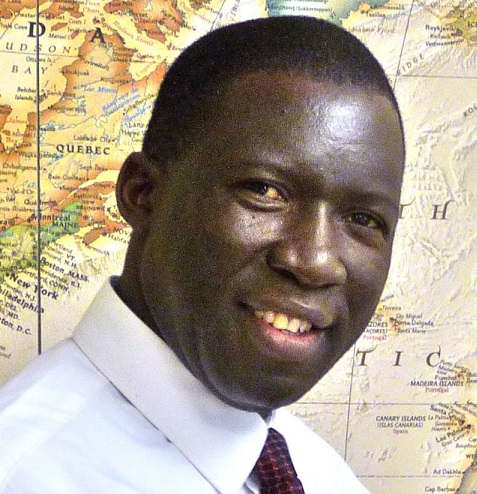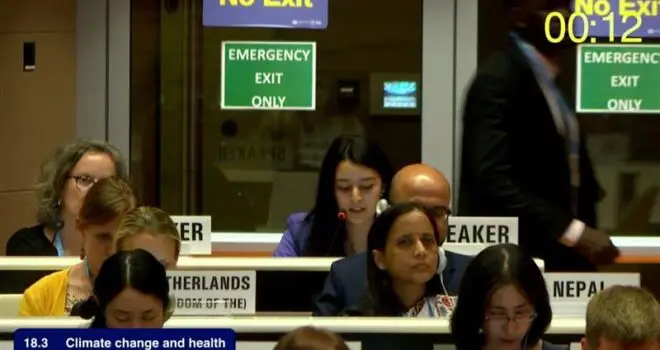
The World Heart Federation (WHF) is delighted to congratulate Prof Fastone M Goma, founding President of our member the Zambia Heart and Stroke Foundation on his WHO World No Tobacco Day 2018 award for his continued efforts in tobacco control.
Prof Goma told us: “I feel honoured to have been nominated for this award by the Tobacco Control Community in Zambia. I owe much to the World Heart Federation that has accredited my attendance to the Conference of Parties to the WHO Framework Convention on Tobacco Control (COPs) and made my work more relevant to the Government and Ministry of Health in Zambia. The contribution of WHF to my capacity-building cannot be over-emphasized.”
Prof Goma has been a pioneering champion and an ardent advocate for Tobacco Control in Zambia. He is the current Chairperson for the Zambia Tobacco Control Consortium which comprises Civil society Organizations involved with Tobacco Control, which has been extremely active in getting the Tobacco Control agenda to take priority on the government agenda. He was involved with the lobby to push for the Zambian government to accede to the FCTC, which happened on 28th August 2008.
Prof Goma conducted the first detailed Zambian Tobacco control situation analysis (June 2009-June 2011) which laid ground for subsequent action by both government and civil society.
During this time he successfully led the first Zambia Tobacco Control Campaign which strongly advocated for the enforcement of smoke-free legislation. This organization initiated a Lusaka City Council facilitated campaign which was launched by the current Republican President Edgar C. Lungu (at the time Deputy Minister in the Office of the Republican Vice-President) in 2009. In this campaign, Prof Goma worked closely with civil society groups such as the Zambia Consumer Association (ZACA) and the Tobacco Free Association of Zambia (TOFAZA) and thus effectively interacted with community structures and facilitated behaviour change at the heart of the civic society. He facilitated the production and distribution of “NO SMOKING” signages in popular public places such as bars, taverns, night clubs, restaurants and bus stations where smoking was common. This led to a heightened awareness of the smoking ban and greatly increased the awareness and support of the public for the enforcement of the smoking ban. At the end of this exercise, awareness and support for the smoke-free law exceeded 85% among both smokers and non-smokers. He has also done research on air quality monitoring using the SidePak AM-Aerosol Monitor as an objective tool for monitoring compliance to the smoke-free law.
Prof Goma has been engaged in the appreciation of the economic dynamics surrounding tobacco farming in Sub-Saharan Africa, Zambia being a large tobacco growing country (2011- 2018). He has actively interacted with small-scale farmers and their traditional leaders in the quest of understanding the cause for their persistent poverty and apparent ill-health. The first wave of the study showed that tobacco growing was slave labour – much labour is put into the agriculture process but very little is received in terms of income. This information is being utilized in the advocacy for alternative crops and alternative livelihoods.
Prof Goma also ably led the pressure group which argued for the enactment of a comprehensive tobacco control law in 2009. This led to an initiation of the processes that produced the first draft of the Tobacco Control Bill in 2010. Although this Bill has stalled, Prof Goma has actively pursued for its revision and resubmission to Legislature. This has made him continue to understand the lacunae that exist in the political system that have been impeding progress. He was therefore key in the advocacy for a “whole-of-government” approach to tobacco control which has finally given birth to the first Inter-Ministerial Liaison Committee on tobacco control which has since started to work at the work on the Bill is expected to be catalyzed.
Prof Goma has been the Technical Expert for the government of the Republic of Zambia at the Conference of the Parties (COP4, 6, 7) and has been at COP3 and COP5 as civil society accredited by the Framework Convention Alliance. At all these occasions he has been very active in articulating Zambian and African positions on Tobacco and Tobacco Control.
Prof Goma lobbied for University of Waterloo, Canada’s consideration for the International Tobacco Control (ITC) Policy Evaluation Project to be done in Africa and Zambia became 1 of the only 4 African countries where this policy evaluation project takes place. This survey, for which Prof Goma is the Principal Investigator has provided the government with a wealth information to guide policy formulation, development and practice. The first report of the ITC Survey was launched on the World No Tobacco Day in 2014 which had the theme, “Raise Taxes” and indeed, in the Budget for 2017 the government has introduced the tobacco specific tax which was advocated for. The ITC Survey findings are also being used as an anchor the advocacy for other policy changes such as the introduction of Pictorial Health Warnings, removal of false descriptors from packets and advocating for a more comprehensive response from a government that fosters a “health-in-all-policies” approach to governance that is aimed at sustaining a healthy nation.
Prof Goma is a Clinical Cardiovascular Scientist and has been core at the mobilization of Cardiologists in particular and other health workers in general to offer assistance for cessation of tobacco use. He was among the first few Africans to train in tobacco dependence treatment and is currently a member of Association for the Treatment of Tobacco Use and Dependence (ATTUD). He has championed the training of frontline health workers in brief motivation interviewing for cessation and piloted integration of smoking cessation corners in TB corners at the Zonal health Centres which proved to be quite innovative and cost-effective. Most of these experiences have been documented in the chapter of the first book to have comprehensive information on tobacco and tobacco use in Zambia (Goma F.M., Ililonga M. and Drope J (2012). Zambia: From Tobacco Control in Africa; People, Politics and Policies. Drope J. editor. International Development Research Centre; 2011. pp. 167–83. Anthem Press (London, UK) and Laval University Press (Quebec City). Online ISBN: 9780857288134. Hardback ISBN: 9780857287830).
Prof Goma has shown to be a very solid support to the Tobacco Control community. His broad base in relation to almost all the articles of the FCTC and eagerness to pursue the principles of the M-POWER approach has made him to be an irreplaceable asset to Zambia and the sub-Saharan sub-region.
Prof Goma as the founding President of the Zambia Heart and Stroke Foundation (ZAHESFO) has made it a key organization in the newly constituted Zambian Non-Communicable Diseases Alliance (ZANACODA). He is also the first Chairman of the ZANACODA which has taken the 4 by 4 approach to advocating for NCDs amelioration that has Tobacco as the main risk factor for all the major NCDs. He therefore continues to raise tobacco awareness on several other platforms which is very commendable.
Prof Goma’s recognition in the international health forum culminated in his appointment to be a Member of the Global Coordinating Mechanism Technical Working Group (GCM-TWG) for the World Health Organization (WHO) on Non-Communicable Diseases in 2015. Together with the other colleagues, they submitted their report in record time.
Prof Goma’s leadership continues to be appreciated. He continues to stand at the nexus of research and knowledge translation on one hand and government and civil society on the other. These virtues make Prof Goma a very unique person in the Tobacco Control fraternity worldwide and worth of the reward at World No Tobacco Day 2018.
Read more: Special recognition awards for World No Tobacco Day by the WHO.


